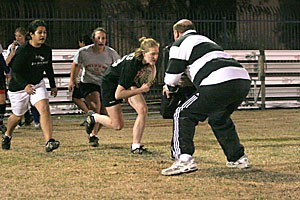In the knock-down, full-contact sport of rugby, team president Katy Strawn refuses to wear a mouth guard.
“”You’re supposed to, though, especially because it costs $2,000 to get a new tooth,”” Strawn said.
Strawn would know. The fifth-year senior for the Arizona women’s rugby team had one of her incisors knocked out two years ago when a teammate elbowed her in the face during a game. Strawn has also played games with cracked ribs and, at one point, a broken hand.
What is she thinking?
“”I’m supposed to (wear the mouth guard), but we’re convinced it’s good luck right now because we’re on a winning streak,”” Strawn said.
Maybe you have to be a little crazy to play the sport of rugby. The fast-paced sport is tackle football with continuous action and no pads.
Men’s rugby has a 37-year tradition on campus, but no monopoly on the madness. Arizona women’s rugby hangs tough and takes as much punishment as its brothers – if not more.
To field a complete rugby team, 15 players need to be on the pitch per side. Arizona women’s rugby has 19 players, which means only four potential substitutes “”on a good day,”” according to team captain Ciara “”CC”” Boger, who is participating in Strawn’s mouth guard boycott.
While Arizona men’s rugby boasts a program with varsity and rookie squads, the UA women often have to play with more injuries to put a competitive squad on the field. This makes the tight-knit squad even tighter.
“”If you’re going to throw your body out there in front of someone, you have to trust that your teammate is going to throw their body out there too,”” Boger said.
Boger cites an away game against Occidental College during last year’s season as proof of her team’s tough-as-nails attitude. Because the team pays for its own travel expenses, it can be difficult to even field a full complement of players during road trips, and Arizona could only bring a mere 14 players against an Occidental squad of 27 women.
“”They had subs up the hoo-ha,”” Boger said.
At one point, Boger was forced out of the action because she thought she had broken her hand when another player stepped on it, leaving Arizona with only 13 players. The hand wasn’t broken, but severely swollen. Nevertheless, she returned to help her team to a 55-10 victory.
“”I think that showed our dedication. … I think a lot of it had to do with the fact that we wanted to win very badly,”” Boger said.
The size of their programs aside, first year assistant coach Rusty Wortman described the differences between men’s and women’s rugby as basically nonexistent.
“”Basically everyone is out there for the same purpose,”” Wortman said. “”They want to hit. They want to tackle. They want to work together as a team. And those are all principles in men’s and women’s rugby.””
Wortman, an Arizona alumnus who graduated in 1992, played for Arizona men’s club rugby during his time in college and was a 20-year veteran of Tucson’s Old Pueblo Rugby Club before his second knee surgery forced him to retire from the sport.
But with Arizona women’s rugby, he has found a way to continue participating on the field.
“”It’s been very positive,”” said Wortman of his coaching experience. “”They want to learn. They want to play the sport. They want to learn more about the sport and the exciting part is you can see them (players) develop and grow, especially over the last couple of months.””
Because rugby is not a traditional American sport, most players at Arizona, men and women, learn to play the sport only after they come out for the club teams. Wortman said that in his experience, women actually have an edge over the men in learning the game.
“”With men’s teams, many of them have played football,”” he said. “”So you’re trying to deprogram them from what football was and it’s very much a challenge as far as that goes.””
Wortman said that even five-time Pro Bowler and Arizona football alumnus Michael Bates had difficulty with the adjustment to rugby when they played together for the Old Pueblo Rugby Club.
“”Trying to de-program him from football to rugby was next to impossible,”” he said.
Wortman said he feels that women, who mostly hail from sports like soccer and softball, generally have an easier time adjusting.
“”You aren’t starting out with them with a preconceived notion of what the game is, so you’re starting from scratch,”” he said. “”That actually makes it a little bit easier.””
Strawn herself played as a soccer goalie before starting in rugby at Arizona.
“”I got kicked a lot in soccer, so I wanted to hit someone back,”” she said.
Boger, who played soccer, softball, and basketball in high school was initially reluctant to try rugby after being out of athletics for a year, but joined the team as a sophomore. She hasn’t looked back since.
“”Once I started playing, I couldn’t stop,”” she said.
Boger encourages other women to come out for the team, even in the middle of the season, as the team is always looking to grow with new athletes.
“”If you come out we’ll teach you how to play the sport and we hope you stick around, because anyone who comes out is important,”” she said.
“”We try to emphasize being a family more than just a team,”” Strawn added.









